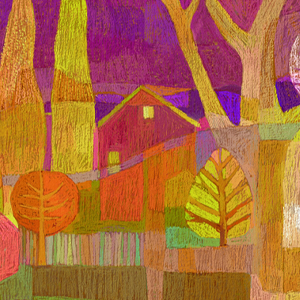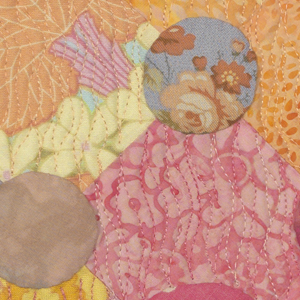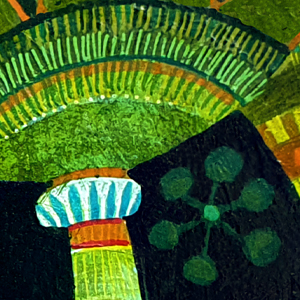
Defining Virtue
Too Many Convictions,Too Little Civic Virtue
Greg Lukianoff
Artwork: “Woods End” by Peter Batchelder © 2016
When you are instructed that you should have the courage of your convictions, it can often feel like an inspiring, even thrilling, directive. After all, America was founded by people who had the courage of their convictions so much so that they were willing to risk their lives in order to free the Colonies from British control. In fact, when we think about the courage of those we admire, we almost never divorce it entirely from the convictions we admire. And the good news is, the founders of the United States were rooted quite firmly in ideas arising from the Scottish Enlightenment that emphasized personal autonomy, freedom, procedural fairness, and rights—not yet understood as universal, but far more expansive than any preceding idea of rights. These are impressive and inspiring convictions to this day.
Courage in a conviction that holds up to scrutiny is noble. On the other hand, we generally don’t give a lot of credit (and rightfully so) to people who might show courage in the face of opposition when their convictions are fundamentally immoral and repugnant.
Did the Nazis show a kind of courage when, in 1923, they took over a beer hall in Munich in the famous Beer Hall Putsch? Well, yes. They put their lives at risk. Do we think this particular kind of courage is commendable? Absolutely not, because their convictions were both racist and tyrannical.
Do we look at the followers of Vladimir Lenin, who ordered land-owning peasants should be hanged in public (to send a message) or “shot on the spot without trial” after World War I because they might have disagreed with his vision of a communist utopia, as courageous? After all, most of them fought in the incredibly bloody Bolshevik Revolution. Unfortunately, some on campus today probably do think of Lenin’s followers as not just courageous but commendable, because we don’t adequately teach about the Red Terror. But that aside, the Bolsheviks’ convictions extended to the superiority of their facile utopian ideology over the lives of at first thousands, and eventually, millions. They believed in the subjugation of human rights and individuality in the name of a larger theoretical idea of the classless society—or really, a society with two classes: the party and everyone else. And they were willing to murder, starve, torture, and terrorize their way to that utopia.
What about the 9/11 hijackers? The comedian Bill Maher’s original show on ABC, “Politically Incorrect,” was canceled after he made the point that the terrorists who flew planes into the World Trade Center were a lot of things, evil included, but they “certainly weren’t cowards.” True, but the public recoiled, because it’s generally unacceptable to compliment the courage of fanatical mass murderers.
So while I would like to heartily endorse the idea that all of you should have the courage of your convictions, the simple truth is, it badly depends on what those convictions actually are. And the way that you learn if your convictions are worth courageously defending is by exercising several of the civic virtues, including, most importantly, humility.
In its simplest form, humility in a democratic society means you don’t believe everyone else is simply stupid or evil, but instead that they are equal citizens who are likely to have good values. Another form is epistemic humility, which is the recognition that our knowledge is filtered through perception. (I use this term over the simpler “intellectual humility,” because epistemic humility conveys the idea that there are not just limits to what is known, but even to what can be known.) In some cases, we disagree with our neighbors because things look differently from where they’re standing. And a really serious thinker should admit that it’s at least possible that, at times, our neighbor’s vantage point is better than ours.
Humility and its fellow civic virtues—such as honesty, respect, tolerance, and compassion—create an environment that enables us to figure out when our neighbors have developed their convictions from a better understanding of the world. Through discussion, thought experimentation, devil’s advocacy, and counterfactuals, we can test and refine our convictions.
These are the things that higher education is meant—but in today’s polarized times often fails—to deliver. Instead, it and many other institutions have retreated from their historic roles as crucibles of truth and now operate as protectors of the faith. Ideological litmus tests in admissions, hiring, and tenure filter out heretics. Bias response teams, which often provide hotline numbers that allow you to report your professors and classmates anonymously, wait to investigate wrongthink. Unfortunately, many college administrations are animated by the spirit of inquisition rather than inquiry, awash in conviction but devoid of civic virtue.
Examples of debatable convictions and an absence of civic virtue abound in higher education. When Fifth Circuit Judge Kyle Duncan went to speak at Stanford Law School last year, students shouted him down before he could even deliver his remarks. An administrator read a performative soliloquy in the middle of the circus, asking whether Duncan’s free speech (that is, his ability to write judicial opinions elsewhere) was really worth all the pain it was allegedly causing law students. What courage does it take to join with almost one-fifth of the entire Stanford Law community to shout down an extremely unpopular guest before he speaks? This looks more like enforcement of the “general will” than bravely speaking truth to power. There’s nothing courageous about “enlightened censorship,” or, as in this case, enlightened bullying.
Civic virtue begins with listening to each other. I believe in what I call the pure informational theory of freedom of speech, which I also call the “lab-in-the-looking-glass theory,” which means that we should permit free expression so that we can know what people really think. You are better off and safer knowing what your fellow citizens genuinely believe, not even if, but especially when their convictions are troubling. Groupthink and cancel culture silence people with dissenting ideas, but as John Morley observed, “you have not converted a man because you have silenced him,” and unexposed convictions go unchallenged and unquestioned. Once those ideas are expressed, we need to consider them with epistemic humility, hear criticisms with grace, show compassion for their wounds, and be honest with our evaluations of their convictions. And when our neighbors indulge our beliefs with the same assumptions, we can work together productively. That’s the work of civic virtue, and as long as it continues, we will learn from each other.
Our convictions might still differ. It might be the case that we never resolve the tension between them. We will certainly generate a lot of art, wisdom, and science in the pursuit; that’s how it has ever been. It might also be the case that some convictions will fail when tested. But if we don’t have the faith in our convictions to subject them to public scrutiny, we should probably abandon them.
This wisdom repeats in history again and again. In his “Faith and Reason” encyclical, Pope John Paul II observed that “reason too needs to be sustained in all its searching by trusting dialogue and sincere friendship.” It might not be terribly shocking that the Pope had the courage of his convictions, and believed very strongly that the Church had nothing to fear from the pursuit of truth, because he believed the truth of his faith. That he also had the insight that the search for knowledge requires civic virtue is impressive.
The law recognizes this too. Legendary jurist Learned Hand said in a 1944 speech that “[t]he spirit of liberty is the spirit which is not too sure that it is right; the spirit of liberty is the spirit which seeks to understand the mind of other men and women[.]” Judge Hand was invoking the role of civic virtue in making the kind of patriotism that merits conviction. That we get closer to the truth by listening to each other is a nontrivial part of the entire adversarial system of common law. Neuroscience supports civic virtue as well. Studies show that individuals who exhibit “openness” (a willingness to explore ideas and values other than their own) as a personality trait tend to be more creative, better leaders, and make better decisions. They also have stronger minds as they age. There are very few humans who genuinely function better in total isolation. The rest of us are social creatures and improve through interaction with others.
Many people believe they have the courage of their convictions. In the age of the Internet and social media, so little is actually at risk when you call for someone to be canceled that calling it “courage” seems excessively self-congratulatory. Even those with the courage to stand up face-to-face against their opponents might not have the commendable kind of courage if they’ve never been willing to examine those convictions and subject them to the scrutiny of both external critics and internal reason.
We may have a situation where large numbers of people have too many convictions and insufficient courage to question them the way a brave and open person should be willing to do.
We should always support and find admirable the courage of conviction of anyone who believes to the heart of their being that life is a process in which truth is hard to know. The pursuit of truth is an arduous, never-ending struggle, chipping away at little pieces of falsity to hopefully inch close to an appreciation of Truth. This habit requires great discipline, self-control, and, well, conviction. But cultivating this kind of conviction in the citizenry is how you have a free and open society that respects fundamental human rights, and also the only type of society that has a fighting chance to understand the world as it actually is.
 Greg Lukianoff is the President and CEO of The Foundation for Individual Rights and Expression and bestselling co-author of The Coddling of the American Mind and The Canceling of the American Mind.
Greg Lukianoff is the President and CEO of The Foundation for Individual Rights and Expression and bestselling co-author of The Coddling of the American Mind and The Canceling of the American Mind.
Spring 2025
Part I: Defining Virtue
James Arthur
Dayna L. Cunningham
Greg Lukianoff
Najeeba Syeed
Interlude: Defining Moments
Part II: Defining Vocation
MORE
















